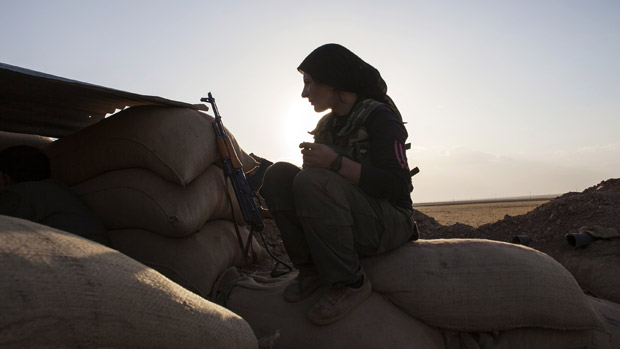YPJ: The Kurdish feminists fighting Islamic State
All-female militia is protecting the Kurdish population from militants – as well as challenging gender roles

A free daily email with the biggest news stories of the day – and the best features from TheWeek.com
You are now subscribed
Your newsletter sign-up was successful
The YPJ, also known as the Women's Protection Unit, has come under increased attack from Islamic State (IS) militants in Syria and is currently involved in the fight for the key border town of Kobane in Syria. Despite this, the group remains relatively unknown outside of the region.
Who are they?
Set up in 2012, the all-female militia group grew out of the Kurdish resistance movement and fights to defend the Kurdish population from attacks by IS militants, the Syrian government as well as the Al Qaeda affiliated al-Nusra Front.
The Week
Escape your echo chamber. Get the facts behind the news, plus analysis from multiple perspectives.

Sign up for The Week's Free Newsletters
From our morning news briefing to a weekly Good News Newsletter, get the best of The Week delivered directly to your inbox.
From our morning news briefing to a weekly Good News Newsletter, get the best of The Week delivered directly to your inbox.
The organisation currently has over 7,000 volunteer fighters between the ages of 18-40. Those under the age of 18 are unable to take part in frontline fighting but are still able to join the movement and undergo military training. They receive no funding from the international community and the women are reliant on the Kurdish community for supplies and food.
What do they do?
The YPJ have fought alongside their male counterparts, the YPG, and the Kurdish Pershmerga in the battle against Islamic State militants. They also played a critical role in rescuing the thousands of Yazidis trapped on Mount Sinjar by IS fighters.
Why have they taken up arms?
A free daily email with the biggest news stories of the day – and the best features from TheWeek.com
"We need to control the area ourselves without depending on [the government]," Evin Ahmed, a 26-year-old fighter told Marie Claire. They can't protect us from [ISIS], we have to protect us [and] we defend everyone…no matter what race or religion they are."
Why are they important?
Aside from the military protection they offer, the group confronts traditional gender expectations in the region and is redefining the role of women in conflict in the region. "I don't want to get married or have children or be in the house all day," said General Zelal, one of the group's leaders. "I want to be free. "
"The YPJ is in itself a feminist movement, even if it is not their main mission," says Erin Trieb, a photographer who documented the daily lives of the women in north-eastern Syria. "They want 'equality' between women and men, and a part of why they joined was to develop and advance the perceptions about women in their culture—they can be strong and be leader," she adds.
Since enlisting, one fighter told Trieb that "the men back home changed their opinions about me and other women. Now they see that we are their equals, and that we have the same abilities, maybe sometimes more than them. They understand we are strong and that we can do everything they can."
Their effectiveness against IS is reportedly magnified simply because they are women. "The saying among many Syrian Kurds is that ISIS is more terrified of being killed by women because if they are, they will not go to heaven," says Trieb.
According to the BBC's Kurdish affairs analysts Cale Salih and Mutlu Civiroglu, both the YPJ and the YPG should play a larger role in the international fight against IS. "They could be a crucial partner to the West," they say.
-
 What to know before filing your own taxes for the first time
What to know before filing your own taxes for the first timethe explainer Tackle this financial milestone with confidence
-
 The biggest box office flops of the 21st century
The biggest box office flops of the 21st centuryin depth Unnecessary remakes and turgid, expensive CGI-fests highlight this list of these most notorious box-office losers
-
 What are the best investments for beginners?
What are the best investments for beginners?The Explainer Stocks and ETFs and bonds, oh my
-
 Epstein files topple law CEO, roil UK government
Epstein files topple law CEO, roil UK governmentSpeed Read Peter Mandelson, Britain’s former ambassador to the US, is caught up in the scandal
-
 Iran and US prepare to meet after skirmishes
Iran and US prepare to meet after skirmishesSpeed Read The incident comes amid heightened tensions in the Middle East
-
 Syria’s Kurds: abandoned by their US ally
Syria’s Kurds: abandoned by their US allyTalking Point Ahmed al-Sharaa’s lightning offensive against Syrian Kurdistan belies his promise to respect the country’s ethnic minorities
-
 Israel retrieves final hostage’s body from Gaza
Israel retrieves final hostage’s body from GazaSpeed Read The 24-year-old police officer was killed during the initial Hamas attack
-
 China’s Xi targets top general in growing purge
China’s Xi targets top general in growing purgeSpeed Read Zhang Youxia is being investigated over ‘grave violations’ of the law
-
 Syria’s Islamic State problem
Syria’s Islamic State problemIn The Spotlight Fragile security in prison camps leads to escape of IS fighters
-
 Panama and Canada are negotiating over a crucial copper mine
Panama and Canada are negotiating over a crucial copper mineIn the Spotlight Panama is set to make a final decision on the mine this summer
-
 Why Greenland’s natural resources are nearly impossible to mine
Why Greenland’s natural resources are nearly impossible to mineThe Explainer The country’s natural landscape makes the task extremely difficult